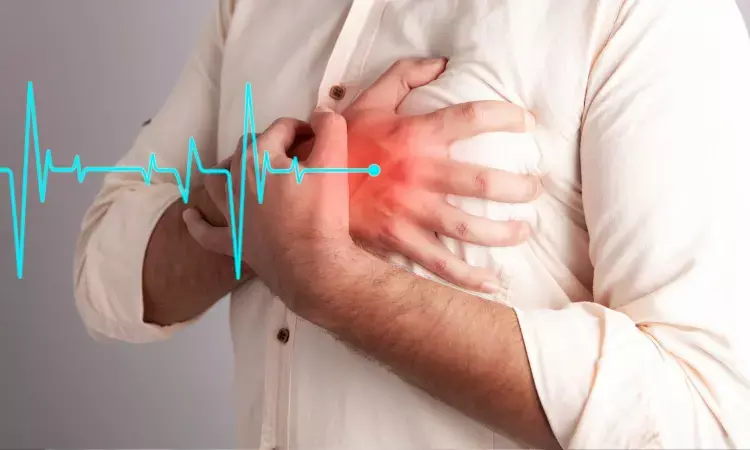- Home
- Medical news & Guidelines
- Anesthesiology
- Cardiology and CTVS
- Critical Care
- Dentistry
- Dermatology
- Diabetes and Endocrinology
- ENT
- Gastroenterology
- Medicine
- Nephrology
- Neurology
- Obstretics-Gynaecology
- Oncology
- Ophthalmology
- Orthopaedics
- Pediatrics-Neonatology
- Psychiatry
- Pulmonology
- Radiology
- Surgery
- Urology
- Laboratory Medicine
- Diet
- Nursing
- Paramedical
- Physiotherapy
- Health news
- Fact Check
- Bone Health Fact Check
- Brain Health Fact Check
- Cancer Related Fact Check
- Child Care Fact Check
- Dental and oral health fact check
- Diabetes and metabolic health fact check
- Diet and Nutrition Fact Check
- Eye and ENT Care Fact Check
- Fitness fact check
- Gut health fact check
- Heart health fact check
- Kidney health fact check
- Medical education fact check
- Men's health fact check
- Respiratory fact check
- Skin and hair care fact check
- Vaccine and Immunization fact check
- Women's health fact check
- AYUSH
- State News
- Andaman and Nicobar Islands
- Andhra Pradesh
- Arunachal Pradesh
- Assam
- Bihar
- Chandigarh
- Chattisgarh
- Dadra and Nagar Haveli
- Daman and Diu
- Delhi
- Goa
- Gujarat
- Haryana
- Himachal Pradesh
- Jammu & Kashmir
- Jharkhand
- Karnataka
- Kerala
- Ladakh
- Lakshadweep
- Madhya Pradesh
- Maharashtra
- Manipur
- Meghalaya
- Mizoram
- Nagaland
- Odisha
- Puducherry
- Punjab
- Rajasthan
- Sikkim
- Tamil Nadu
- Telangana
- Tripura
- Uttar Pradesh
- Uttrakhand
- West Bengal
- Medical Education
- Industry
Hemodynamic monitoring tied to improved life quality among HF patients: Lancet

According to a study published in The Lancet, it has been determined that heart failure patients who underwent hemodynamic monitoring experienced enhanced quality of life when compared to those who solely received contemporary guideline-directed medical therapy. Researchers in this study found that the rate of hospitalizations due to heart failure got reduced by 44% in the hemodynamic monitoring group compared to the control.
This study was led by Dr Jasper J Brugts, MD and colleagues. Explaining the study background, In the USA, they said previous research has already highlighted the effect of haemodynamic monitoring of pulmonary artery pressure.
There needs to be more data for a better understanding of patients treated with contemporary guideline-directed medical therapy with long-term follow-up in a different health-care system.
MONITOR-HF was an open-label, randomised trial. The trial was conducted in Netherlands across 25 centres. Eligible patients had a history of chronic heart failure (New York Heart Association class III), and hospitalisation due to previous heart failure irrespective of ejection fraction.
Patients were randomly assigned at 1:1 in two groups, haemodynamic monitoring and standard care. All patients met the clinician at 3 months and 6 months, and every 6 months thereafter, up to 48 months.
The mean difference in the KCCQ overall summary score at 12 months was measured as the primary endpoint in the study.
The findings of the study are:
- CardioMEMS-HF group had 176 patients and the control group had 172 patients.
- These 348 patients in total had mean age 69 years.
- The median ejection fraction was 30%.
- Researchers found a difference in mean change in KCCQ overall summary score at 12 months as 7·13 between groups.
- OR of an improvement of at least 5 points in KCCQ's overall summary score was OR 1·69.
- In comparison to the standard group, the calculated OR of a deterioration of at least 5 points was 0·45 in the CardioMEMS-HF group.
- The freedom of device-related or system-related complications and sensor failure were 97·7% and 98·8%, respectively.
According to the researchers, our study revealed that "In individuals with a previous diagnosis of moderate-to-severe heart failure, receiving treatment according to current guidelines, the implementation of haemodynamic monitoring resulted in an improvement in quality of life and a reduction in hospitalizations related to heart failure." These findings offer collective support for the effectiveness of this technology and may have significant implications for both guideline recommendations and the adoption of remote pulmonary artery pressure monitoring. It is important to note that the study received financial support from the Dutch Ministry of Health, the Health Care Institute (Zorginstituut), and Abbott Laboratories, which is duly acknowledged.
Further reading:
https://www.thelancet.com/journals/lancet/article/PIIS0140-6736(23)00923-6/fulltext
BDS, MDS in Periodontics and Implantology
Dr. Aditi Yadav is a BDS, MDS in Periodontics and Implantology. She has a clinical experience of 5 years as a laser dental surgeon. She also has a Diploma in clinical research and pharmacovigilance and is a Certified data scientist. She is currently working as a content developer in e-health services. Dr. Yadav has a keen interest in Medical Journalism and is actively involved in Medical Research writing.
Dr Kamal Kant Kohli-MBBS, DTCD- a chest specialist with more than 30 years of practice and a flair for writing clinical articles, Dr Kamal Kant Kohli joined Medical Dialogues as a Chief Editor of Medical News. Besides writing articles, as an editor, he proofreads and verifies all the medical content published on Medical Dialogues including those coming from journals, studies,medical conferences,guidelines etc. Email: drkohli@medicaldialogues.in. Contact no. 011-43720751


